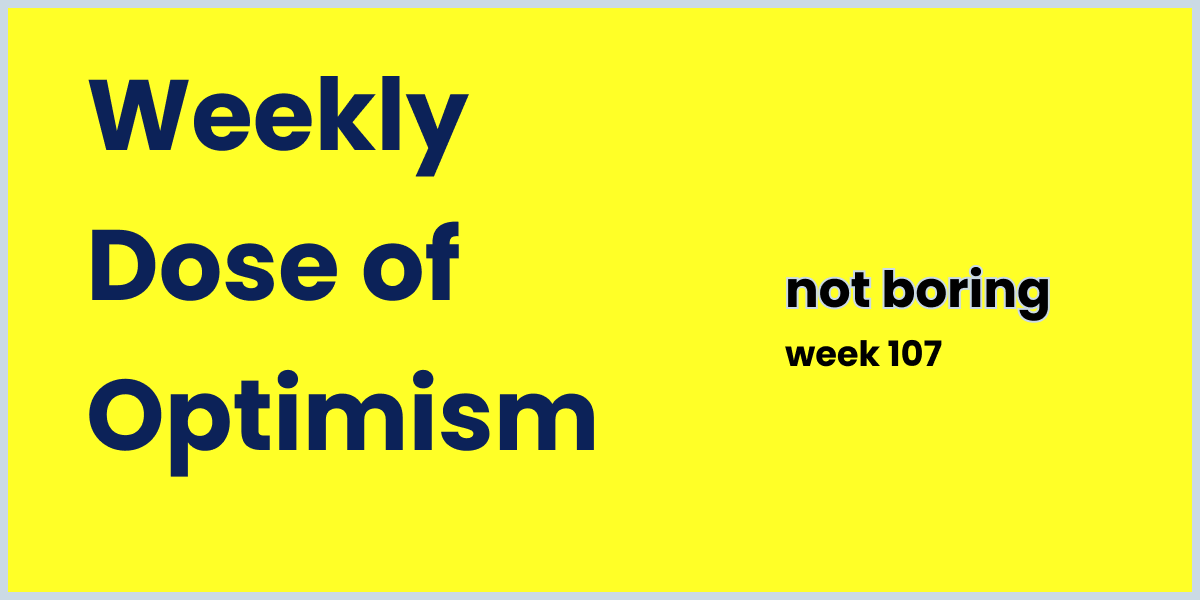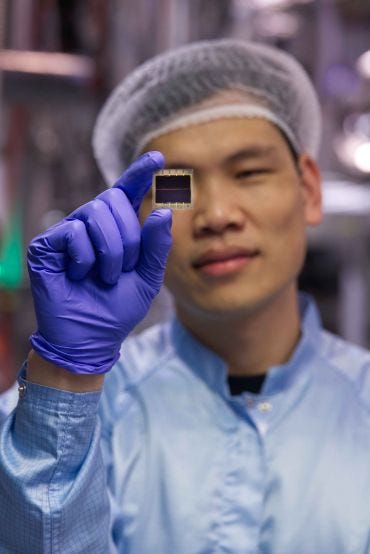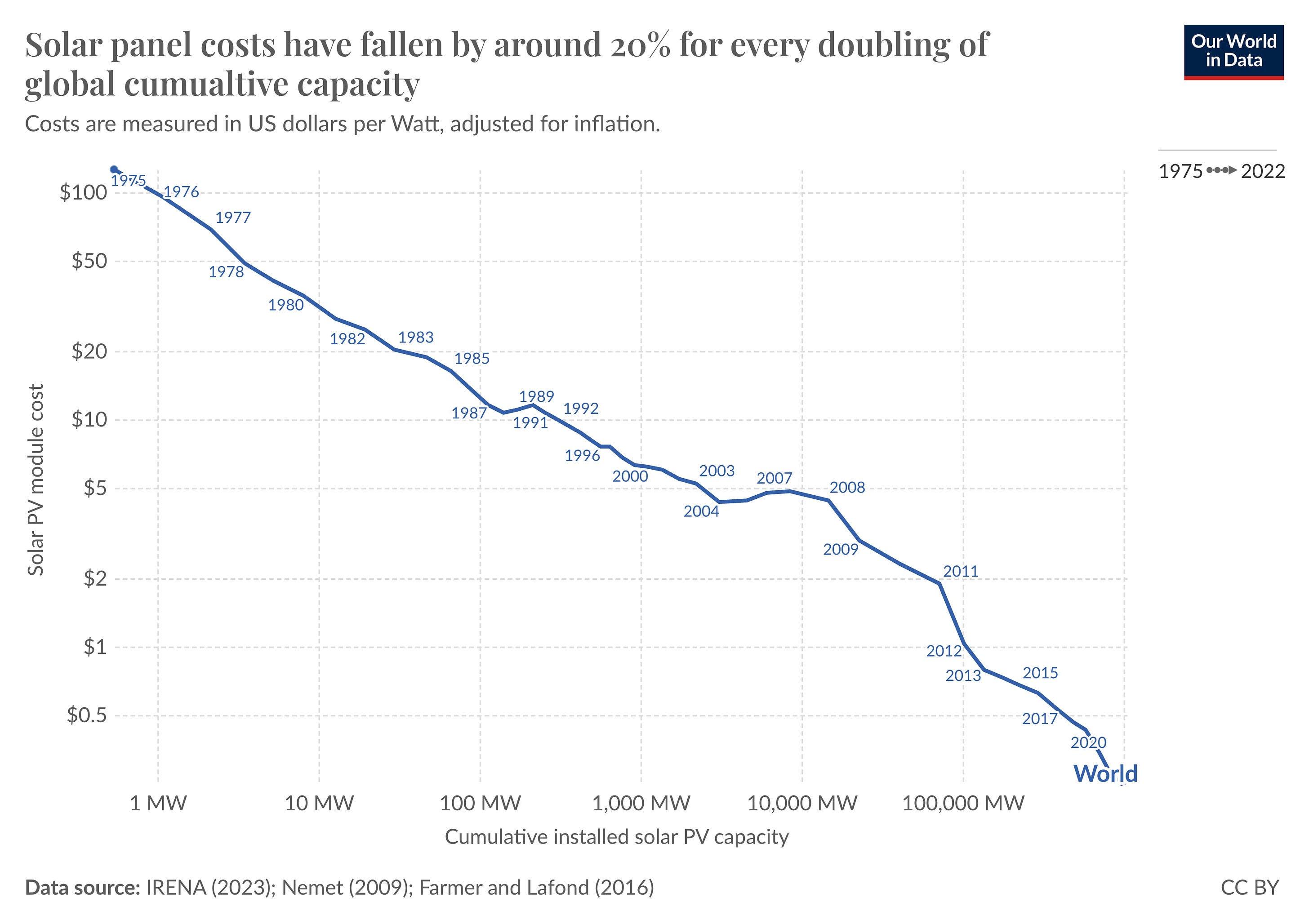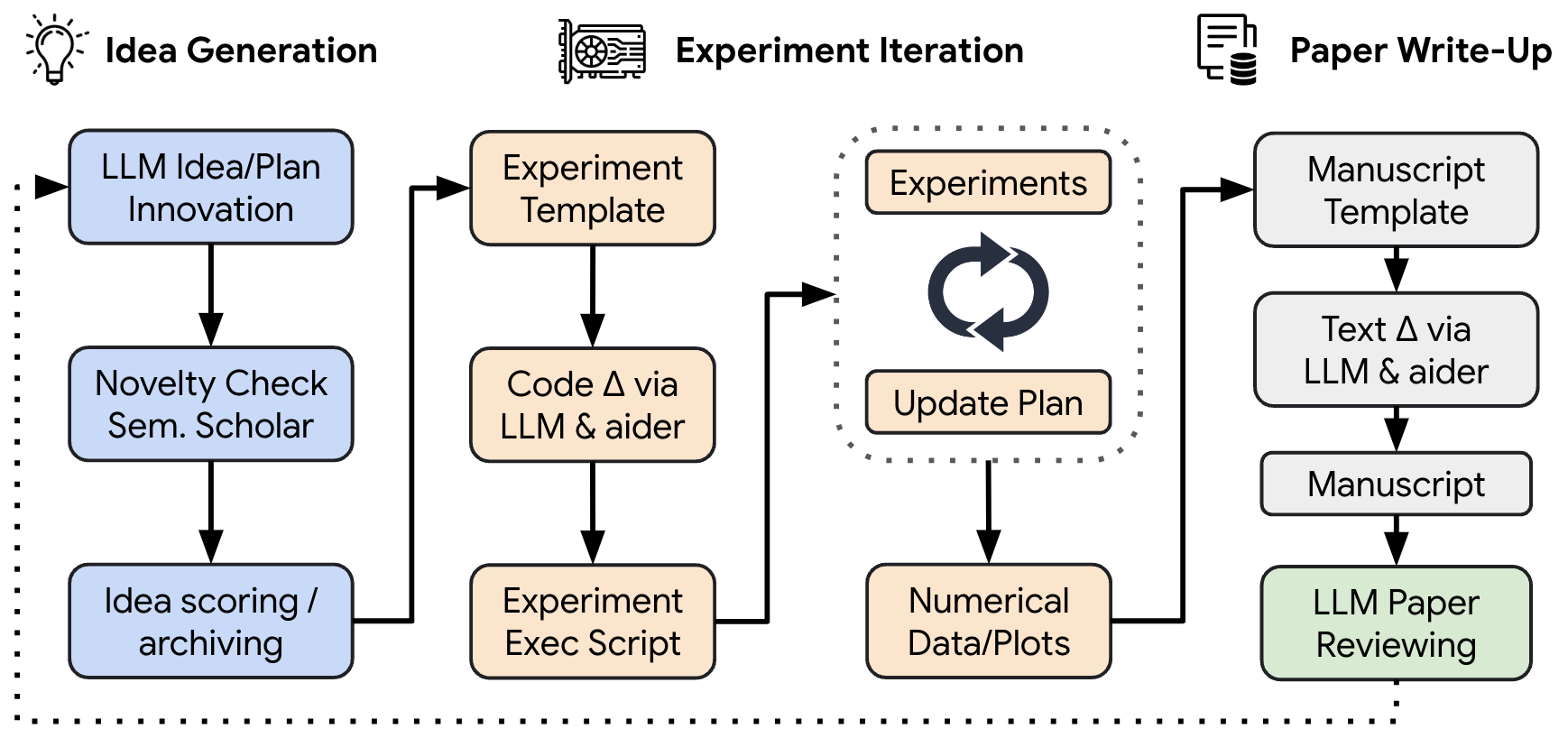Not Boring by Packy McCormick - Weekly Dose of Optimism #107
Weekly Dose of Optimism #107Solar Material, AI Scientist, Ozempic, Rent Control Afuera, ConsciousnessToday’s Not Boring is brought to you by… Eight Sleep Eight Sleep helps you sleep better, and better sleep helps you do everything else better. On Tuesday, I wrote a Deep Dive on Eight Sleep. One of my favorite things about writing Deep Dives is that, after I send them, I learn how people feel about the company from replies: Andrew McCalip (Varda): “It's the single most quality-of-life increasing piece of hardware I own. Am not an investor, nor sponsored, just a happy customer...” Ashley Pelzel (Astro Mechanica): “User from the early days, game changer. My husband and I bring it on roadtrips.” Aleks Gempel (Cuby): “To date, still my favorite purchase. User from the original pod to now Pod 4” The people building the world’s most cutting-edge hardware trust Eight Sleep’s hardware to help them sleep better and perform better. If you want to improve your sleep and you can afford to buy one, you can’t afford not to. Use the Not Boring link for $350 off: Hi friends 👋, Happy Friday and welcome back to our 107th Weekly Dose of Optimism. Just a very solid, solid week for the optimists. Some solar breakthroughs matched with the scientific discovery processes being automated, and topped off with free market capitalism just doing its thing down in Buenos Aires. Even during the “normal” weeks, things happen that can totally and positively change the trajectory of our future. Let’s get to it. (1) Solar energy breakthrough could reduce need for solar farms From University of Oxford
Oxford University researchers have developed a thin-film perovskite material that can be applied to all kinds of surfaces like cars and buildings to generate solar electricity. This material is flexible, ultra-thin, and can achieve over 27% energy efficiency, rivaling traditional silicon-based solar panels. Solar’s ascent (descent?) has been a modern marvel. It has the most picturesque learning curve. That beautiful chart is only possible due to thousands of technological advancements, economies of scale, and competition driving down prices. And the chart may only continue to get more beautiful thanks to innovations like the ultra-thin solar panel described above. Imagine instead of land-guzzling solar farms, all of our personal items were covered with a thin film that sucked in solar energy and provided our daily energy needs. Cars, backpacks, baseball caps, even clothes…all stylish little solar farms. That future may not be as far off as you think. The team behind the research has already spun out into a private company and has begun large scale manufacturing of the perovskite-on-silicon tandem solar cells at its factory in Germany. (2) The AI Scientist: Towards Fully Automated Open-Ended Scientific Discovery From Sakana AI
Soon we might not even need cracked research teams like the one at Oxford. Sakana AI introduced "The AI Scientist," a system that automates the entire scientific research process, from idea generation to paper writing and peer review. It can independently conduct research, generate new ideas, and continuously improve them. And it’s efficient, producing papers at a much lower cost that traditional scientific research processes. The AI Scientist follows a three-step process for conducting scientific research:
Voilà, we have a scientist! And it’s actually already working: The AI Scientist generated a paper titled "Adaptive Dual-Scale Denoising," which introduces a novel approach in diffusion models. While the paper wasn’t flawless, it proposed an innovative direction and showed good empirical results from experiments it conducted and reviewed. In addition, The AI Scientist has generated legit papers in other machine learning fields like language modeling and transformers. It doesn’t take an AI researcher to see how a recursive AI Scientist could meaningfully accelerate the pace of discovery in both AI and other scientific fields. Unlike human scientists, an AI Scientist could run against hundreds of research directions at once, incorporate all experimental data across its projections, feed that data back into new brainstorm seshes, work 24/7, and do all of it at the fraction of the cost of a human scientist. It’s not super hard to imagine a world in which an AI Scientist is just pumping out breakthrough after breakthrough. This is the world that Leopold Aschenbrenner described in Situational Awareness. It makes sense that Sakana is starting in AI research, where everything is digital. It may be a while before AI can run its own experiments in the physical world, but that will happen one day, too. What are we humans to do? We can all get a little better at science ourselves. Yesterday, Union Square Ventures announced an investment in Consensus, which makes an “AI Search Engine for Research.” If Not Boring starts sounding a little more sophisticated, you’ll know why. (3) Why Does Ozempic Cure All Diseases? From Astral Codex Ten
Scott Alexander attempts to answer a question that I am sure many of us have asked ourselves over the last couple of years, especially since we keep sharing Ozempic stories in the Weekly Dose: how and why is Ozempic seemingly so effective at treating diseases outside of diabetes? At this point it’s relatively obvious that Ozempic works in treating obesity. Patients can expect to lose 5-15% of their body weight over the course of several months. It’s an effective and, from what we can tell, safe weight loss treatment that works on almost every body that takes it. But as we’ve pointed out multiple times in the Weekly Dose, Ozempic (and its other GLP-1 brethren) has also proven to be effective in treating things like heart diseases, Parkinson’s, alcoholism, and drug addiction. Meaning Ozempic isn’t just a weight loss drug. It’s about as close to a “miracle drug” that we’ve found. And we don’t say that lightly. But how and why Ozempic is so rangy is not entirely understood. Alexander’s line of thinking is this: GLP-1s are master signals that governs the body's state of being either well-fed or starving. This signal influences numerous bodily processes, including metabolism, inflammation, and reward systems. This broad influence on these fundamental processes may explain why GLP-1s appear to be effective across so many conditions. At a high level: this checks out to me. And if Ozempic has survived the Astral Codex Ten treatment, we feel comfortable continuing to share every new miracle the drug produces. (4) Javier Milei Got Rid of Rent Control in Argentina. Housing Supply Skyrocketed Jesus Mesa for Newsweek
¡Control de alquileres…AFUERA! Uhh ohh…looks like at least some of Milei’s free-market approaches are working. Back in December, Milei repealed an Argentinian rent control policy that had driven up rents, decreased rental supply, and forced tenants into unfavorable leases. In the three quarters since the rental control policy was repealed, rental supply in Buenos Aires has jumped nearly 3x and prices have dropped. We are not experts in rent control policies — to me there’s seems to be pretty reasonable pros and cons on each side. As a New Yorker, I don’t love how rent control policies contribute to my laughably high rent on my 1 bedroom apartment. But I also don’t think I’d love New York as much if every old school New Yorker that’s lived in the city for decades was replaced by wave after wave of yuppies with unlimited willingness to pay. But Buenos Aires is not New York! And Argentina is not America. It had (has) some serious problems as a result of decades of government intervention, bad policies, and corruption. And sometimes serious problems call for radical changes. The world is a big, diverse place, and it’s fascinating to watch different countries run a bunch of different experiments. Will Argentina’s turn to free market capitalism bring restore its economy to its former glory? Will Europe’s love of regulation and distaste for free speech and nuclear power return the continent to the Dark Ages? This is why we run experiments! At the very least, it’s great training data for Sakana. Rent control…AFUERA! (5) We’re Still Learning So Much About the Human Body International Study Detects Consciousness in Unresponsive Patients From Mass General Brigham
and Massive biomolecular shifts occur in our 40s and 60s, Stanford Medicine researchers find From Stanford Medicine
Packy here. Two separate studies caught my eye this week, both of which point to the fact that there is still so much we don’t know about our bodies. In the first, a Mass General Brigham study found signs of consciousness in 25% of patients with severe brain injuries who appear unresponsive. This phenomenon, called cognitive motor dissociation, indicates that some patients can understand language and follow instructions covertly, even without visible responses. The studies were executed by assessing 241 unresponsive patients with severe brain injuries using fMRI and EEG tests to detect covert cognitive responses to specific instructions, with data collected over 15 years across six different sites in the US, UK, and Europe. In the second, a Stanford Medicine study revealed that biological aging is not a constant process, but rather involves two periods of rapid change around ages 44 and 60. Researchers analyzed over 135,000 different molecules and microbes in people aged 25 to 75, totaling nearly 250 billion distinct data points. They found that about 81% of all studied molecules showed non-linear fluctuations, with the most significant changes clustering around these two age points. These changes affect various biological processes, including cardiovascular health, immune function, and metabolism. This is crazy to me. Something like 100 billion people have lived and many of them have reached old age, and only now are we realizing that there are step functions instead of a smooth curve in the aging process. Why? Why did humans evolve in such a way that people started breaking down at 44 and 60 specifically? And the fact that some people who seem fully unresponsive are actually conscious and able to respond appropriately to stimuli in their minds, but not express themselves in their bodies, is equally wild. Both of these studies are a starting point. We now have more knowledge about how the human body and mind work. Hopefully, with that knowledge, other researchers will figure out what we can so about it. Is there more we can do to save people we otherwise would have assumed are beyond saving, maybe using brain-computer interfaces like the ones from Neuralink and Precision Neuroscience? Are there interventions we can make before people turn 44 and 60 to retain the benefits of youth? Obviously, a lot more work needs to be done, but if David Deutch’s Principle of Optimism is that “All evils are caused by insufficient knowledge,” this was a big week in the fight against evil. Have a great weekend y’all. Thanks to Eight Sleep for sponsoring! We’ll be back in your inbox on Tuesday. Thanks for reading, Packy + Dan |
Older messages
Eight Sleep
Tuesday, August 13, 2024
Waking Up in the Future ͏ ͏ ͏ ͏ ͏ ͏ ͏ ͏ ͏ ͏ ͏ ͏ ͏ ͏ ͏ ͏ ͏ ͏ ͏ ͏ ͏ ͏ ͏ ͏ ͏ ͏ ͏ ͏ ͏ ͏ ͏ ͏ ͏ ͏ ͏ ͏ ͏ ͏ ͏ ͏ ͏ ͏ ͏ ͏ ͏ ͏ ͏ ͏ ͏ ͏ ͏ ͏ ͏ ͏ ͏ ͏ ͏ ͏ ͏ ͏ ͏ ͏ ͏ ͏ ͏ ͏ ͏ ͏ ͏ ͏ ͏ ͏ ͏ ͏ ͏ ͏ ͏ ͏ ͏ ͏ ͏ ͏ ͏ ͏ ͏ ͏ ͏ ͏ ͏
Weekly Dose of Optimism #106
Friday, August 9, 2024
Nudge, Alzheimer's Detection, Robotic Ping Pong, Samsung Batteries, Anduril Series F, Embrace Innovation ͏ ͏ ͏ ͏ ͏ ͏ ͏ ͏ ͏ ͏ ͏ ͏ ͏ ͏ ͏ ͏ ͏ ͏ ͏ ͏ ͏ ͏ ͏ ͏ ͏ ͏ ͏ ͏ ͏ ͏ ͏ ͏ ͏ ͏ ͏ ͏ ͏ ͏ ͏ ͏ ͏ ͏ ͏ ͏ ͏ ͏
Weekly Dose of Optimism #106
Friday, August 9, 2024
Nudge, Alzheimer's Detection, Robotic Ping Pong, Samsung Batteries, Anduril Series F, Embrace Innovation ͏ ͏ ͏ ͏ ͏ ͏ ͏ ͏ ͏ ͏ ͏ ͏ ͏ ͏ ͏ ͏ ͏ ͏ ͏ ͏ ͏ ͏ ͏ ͏ ͏ ͏ ͏ ͏ ͏ ͏ ͏ ͏ ͏ ͏ ͏ ͏ ͏ ͏ ͏ ͏ ͏ ͏ ͏ ͏ ͏ ͏
Radiant
Tuesday, August 6, 2024
Nuclear Power for Earth, Then for Mars ͏ ͏ ͏ ͏ ͏ ͏ ͏ ͏ ͏ ͏ ͏ ͏ ͏ ͏ ͏ ͏ ͏ ͏ ͏ ͏ ͏ ͏ ͏ ͏ ͏ ͏ ͏ ͏ ͏ ͏ ͏ ͏ ͏ ͏ ͏ ͏ ͏ ͏ ͏ ͏ ͏ ͏ ͏ ͏ ͏ ͏ ͏ ͏ ͏ ͏ ͏ ͏ ͏ ͏ ͏ ͏ ͏ ͏ ͏ ͏ ͏ ͏ ͏ ͏ ͏ ͏ ͏ ͏ ͏ ͏ ͏ ͏ ͏ ͏ ͏ ͏ ͏ ͏ ͏ ͏ ͏
Weekly Dose of Optimism #105
Friday, August 2, 2024
NYT Gets Nuke Pilled, Nuclear Pebble-Beds, Nuclear Aatmanirbhar Bharat, IL-11 Treatment, HIV Treatment ͏ ͏ ͏ ͏ ͏ ͏ ͏ ͏ ͏ ͏ ͏ ͏ ͏ ͏ ͏ ͏ ͏ ͏ ͏ ͏ ͏ ͏ ͏ ͏ ͏ ͏ ͏ ͏ ͏ ͏ ͏ ͏ ͏ ͏ ͏ ͏ ͏ ͏ ͏ ͏ ͏ ͏ ͏ ͏ ͏ ͏ ͏ ͏ ͏
You Might Also Like
🔮 $320B investments by Meta, Amazon, & Google!
Friday, February 14, 2025
🧠 AI is exploding already!
✍🏼 Why founders are using Playbookz
Friday, February 14, 2025
Busy founders are using Playbookz build ultra profitable personal brands
Is AI going to help or hurt your SEO?
Friday, February 14, 2025
Everyone is talking about how AI is changing SEO, but what you should be asking is how you can change your SEO game with AI. Join me and my team on Tuesday, February 18, for a live webinar where we
Our marketing playbook revealed
Friday, February 14, 2025
Today's Guide to the Marketing Jungle from Social Media Examiner... Presented by social-media-marketing-world-logo It's National Cribbage Day, Reader... Don't get skunked! In today's
Connect one-on-one with programmatic marketing leaders
Friday, February 14, 2025
Enhanced networking at Digiday events
Outsmart Your SaaS Competitors with These SEO Strategies 🚀
Friday, February 14, 2025
SEO Tip #76
Temu and Shein's Dominance Is Over [Roundup]
Friday, February 14, 2025
Hey Reader, Is the removal of the de minimis threshold a win for e-commerce sellers? With Chinese marketplaces like Shein and Temu taking advantage of this threshold, does the removal mean consumers
"Agencies are dying."
Friday, February 14, 2025
What this means for your agency and how to navigate the shift ͏ ͏ ͏ ͏ ͏ ͏ ͏ ͏ ͏ ͏ ͏ ͏ ͏ ͏ ͏ ͏ ͏ ͏ ͏ ͏ ͏ ͏ ͏ ͏ ͏ ͏ ͏ ͏ ͏ ͏ ͏ ͏ ͏ ͏ ͏ ͏ ͏ ͏ ͏ ͏ ͏ ͏ ͏ ͏ ͏ ͏
Is GEO replacing SEO?
Friday, February 14, 2025
Generative Engine Optimization (GEO) is here, and Search Engine Optimization (SEO) is under threat. But what is GEO? What does it involve? And what is in store for businesses that rely on SEO to drive
🌁#87: Why DeepResearch Should Be Your New Hire
Friday, February 14, 2025
– this new agent from OpenAI is mind blowing and – I can't believe I say that – worth $200/month






